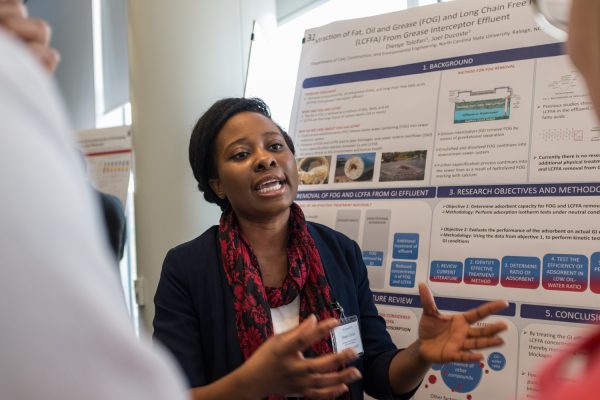Dozens of research posters exhibited along the perimeter of Duke Energy Hall in the James B. Hunt Jr. Library were a vibrant display of the work of students in the Environmental, Water Resources, and Coastal Engineering (EWC) Group of CCEE. Topics ranged from morphological modeling of barrier islands off North Carolina’s coast, to developing a quantitative framework for describing heat accumulation in landfills, to developing life-cycle models of microalgae that are harvested for biofuel production. This year marked the 17th year the EWC Symposium has been held in its current format.

Part of the annual EWC Symposium, held this year on March 3rd, the poster session gives students a chance to describe their work to their peers, faculty, visiting recruits, a host of judges, and other visitors from the surrounding professional community.
From a field of 49 posters this year, the judges chose seven finalists who were given five minutes each to concisely explain their research objectives and findings. In addition to first, second, and third place awards, there was an applied research prize given by the Research Triangle Park Chapter of the Air and Waste Management Association.

LIST OF WINNERS
First Place: Jeff Thomas, “An evaluation of long-term effects of energy policy in North Carolina,” advised by Joseph DeCarolis
Second Place: Amie McElroy, “Enrichment cultures from North Carolina streams can co-metabolize 1,4-dioxane to sub microgram per liter concentrations,” advised by Detlef Knappe and Michael Hyman
Third Place: Sanjam Singh, “Comparison of fuel economy and gaseous emissions of gas-direct injection versus port-fuel injection light duty vehicles based on real-world measurements,” advised by Christopher Frey
AWMA Applied Research Prize: Dienye Tolofari, “Extraction of fat, oil and grease and long chain fatty acids from grease interceptor effluent,” advised by Joel Ducoste
In addition to the poster sessions, the annual symposium featured a keynote address after the awards ceremony. The keynote speaker at this year’s symposium was Professor Paul Westerhoff from the School of Sustainable Engineering and the Built Environment at Arizona State University. In his inspiring talk, Dr. Westerhoff explored opportunities to innovate water treatment with nanotechnology. Apart from discussing research results, he encouraged the audience to incorporate entrepreneurial thinking when developing research ideas.
CCEE thanks the 29 individuals who volunteered their time on the judging panel, as well as our generous fiscal sponsors. The Symposium was sponsored by Draper Aden Associates, Smith Gardner, Hazen and Sawyer, EREF, Freese and Nichols, AECOM, Geosyntec, HDR, Dewberry, Black & Veatch, and A&WMA RTP.

